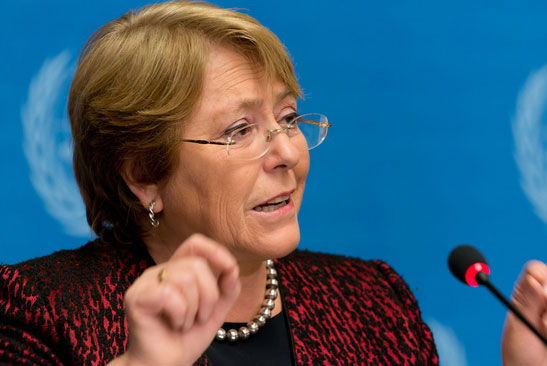Sri Lanka has failed to seize opportunity provided by UNHRC - report
March 8, 2019 05:02 pm
The UN High Commissioner for Human Rights Michelle Bachelet says the “lack of progress” shows that the situation of human rights in Sri Lanka should remain firmly on the agenda of the UN Human Rights Council.
In the latest report on Sri Lanka by the Office of the United Nations High Commissioner for Human Rights (OHCHR), the High Commissioner therefore urges the Council to remain closely engaged with the Government of Sri Lanka and to continue to monitor developments in the country.
The report said that in 2015, by co-sponsoring Human Rights Council resolution 30/1, the Government of Sri Lanka recognized the need to address the past in order to build a brighter future, grounded in accountability, respect for human rights and the rule of law.
“The lack of decisive steps to that end, and of appropriate communication, has generated widespread frustration,” it said.
“The lack of accountability for past actions likely contributed to the return of violence against minorities in March 2018, and played a role in undermining the principles of democracy and the rule of law in October and November 2018.”
The High Commissioner notes the constructive engagement of the Government of Sri Lanka with OHCHR and United Nations human rights mechanisms since January 2015.
The report said that the Government has made progress in human rights issues and its engagement with civil society in some areas. “Progress in its commitments to transitional justice has, however, been inconsistent and subject to considerable delay, partly because of the lack of a time-bound comprehensive strategy.”
Such important achievements as the establishment of the Office on Missing Persons and the Office for Reparations, and the national consultations have been neither adequately supported by the political leadership nor sufficiently linked to the accountability and truth-seeking components that should be at the core of the reconciliation and accountability agenda, it said.
The High Commissioner nonetheless praises the commitment of and efforts made by some officials, particularly in several ministries, the Secretariat for Coordinating Reconciliation Mechanisms, the Office on Missing Persons, the Office for National Unity and Reconciliation and the Human Rights Commission, who have relentlessly endeavoured to push the human rights and reconciliation agenda forward.
“The lack of progress shows that the situation of human rights in Sri Lanka should remain firmly on the agenda of the Human Rights Council. The High Commissioner therefore urges the Council to remain closely engaged with the Government of Sri Lanka and to continue to monitor developments in the country.”
The High Commissioner also expresses concerned that, despite its lengthy preparation and the consultation of expert advice, the final bill on counter-terrorism law might not comply fully with international human rights norms and standards.
“Even in its present form, the bill contains problematic features, such as an overly broad definition of terrorism,” it stressed.
The High Commissioner also urges Sri Lanka to continue to uphold the moratorium on the death penalty and to work towards prohibiting the practice altogether, recalling the fact that the United Nations opposes the use of capital punishment in all circumstances.
The High Commissioner encourages the Government to seek the opinion of the Human Rights Commission of Sri Lanka when drafting legislation, bearing in mind the mandate of the institution to advise on human rights compliance of draft legislation.
The report also states that the regular criminal justice system in Sri Lanka continues to suffer from serious structural weaknesses, which are reflected in lengthy delays in investigations and in judicial processes in general, also characterized by long periods of detention on remand and a bail system that is applied inconsistently and in a discriminatory way.
“Consequently, while prisons are overcrowded with petty criminals (even minor drug possession charges, which are not subject to bail, can lead to pretrial detention), individuals charged with serious crimes, including enforced disappearances, are able to obtain bail,” the report said.
The High Commissioner stresses that the risk of new violations increases when impunity for serious crimes continues unchecked. “To date, Sri Lanka has failed to seize the opportunity provided by the Human Rights Council to establish a trustworthy domestic mechanism to address impunity or to show, by consistent progress in emblematic cases, that such a mechanism is not necessary.”
It said that some segments of civil society have continued to call for international investigations and for the Security Council to refer the situation in Sri Lanka to the International Criminal Court for international prosecutions and adjudication of those most responsible for these crimes.
“The High Commissioner once again encourages Member States to prosecute Sri Lankans suspected of crimes against humanity, war crimes or other gross violations of human rights, in accordance with universal jurisdiction principles.”
OHCHR says it has continued to receive credible information about cases of abduction, unlawful detention, torture and sexual violence by Sri Lanka security forces, which allegedly took place in 2016 to 2018.
“A preliminary assessment of the information received indicates that there are reasonable grounds to believe that accounts of unlawful abductions and detention and of torture, including incidents of sexual violence against men and women, are credible, and that such practices might be continuing in northern Sri Lanka.”
“Such allegations should be the subject of prompt, effective, transparent, independent and impartial investigations,” the report said.
The High Commissioner also expresses her concern at the appointment, on 9 January 2019, of Major General Shavendra Silva as the Chief of Staff of the Sri Lanka Army.
The High Commissioner is “deeply concerned” at the aggravation of intercommunal tensions, in particular at several attacks conducted by militant Buddhist groups targeting cultural, religious (including the Muslim community and evangelical Christians) or sexual minorities, the report said.
The UN High Commissioner for Human Rights will formally present the report to the UN Human Rights Council on March 20.
Sri Lanka-OHCHR Report by on Scribd












